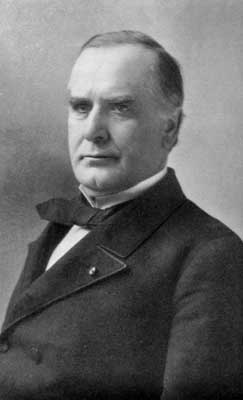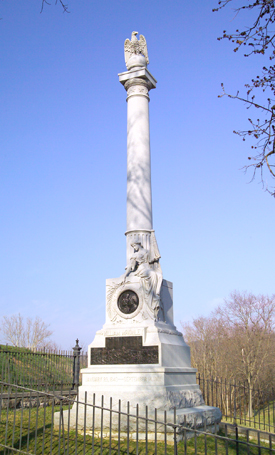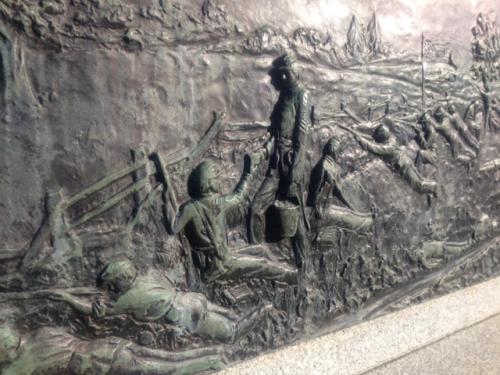Monday, August 31, 2015

Probably not one in 20 Americans could tell you three facts about William McKinley, our 25th President. He was thoroughly overshadowed by Teddy Roosevelt, the flamboyant and transformative Chief Executive who succeeded him when he was assassinated—that, by the way, is the one fact that one in 20 probably do know. Probably three-fourths of those ignorant 20 know the name Mount McKinley, however, and that it is the tallest mountain peak in the United States.
That alone was one very good reason to keep the mountain named as it was. A nation and its culture requires continuity, tradition, reverence and respect to its past, and it is important for a nation to have abundant reminders of important historical figures who would be forgotten over time without landmarks, memorials, monuments, holidays, town names, statues and streets that prompt this kind of exchange with one’s children and grandchildren:
“Who was McKinley, daddy?“
…Or Lincoln, or Washington…or Obama. A nation that respects and strengthens these bonds with its own history helps ensure that the public maintains a common understanding of the nation’s character and mission. In the case of the United States, it reinforces the vital concept ours is a nation of one people, not warring tribes and factions. This is especially true of our Presidents, who were and are the leaders of the entire nation, not just specific regions, states and nationalities.
It is not surprising that Barack Obama back-handedly removed the name of a predecessor from a mountain for narrow and short term political advantage, because he does not see the nation the way I just described it—which was, it is important to note, very much the way William McKinley saw it. “The mission of the United States is one of benevolent assimilation,” he said. “Our differences are policies; our agreements, principles,” he said. That there could be anything controversial about having a mountain within the United States named after a President of the United States would have baffled him.
It would also have shocked him that any President would try to divide the country rather than unite it, but that’s our Barack. His entire political rise and preferred method of maintaining power has been to emphasize group identity politics over patriotism and nationalism. This is yet another example, and one that is likely to be forgotten in a day or two—you know, like William McKinley. It is not as inconsequential as it seems.
The White House’s announcement of the change was simple-minded and insulting to McKinley’s legacy and memory:
“McKinley became our 25th President, and was tragically assassinated just six months into his second term,” read the statement. “But he never set foot in Alaska — and for centuries, the mountain that rises some 20,000 feet above sea level, the tallest on the North American continent, had been known by another name — Denali.”
In fact, it was still is known by that other name. When I was in Alaska, I never heard Mt. McKinley called anything but Denali, though I’m sure there were McKinleyites around somewhere. What was so wrong with using the local name locally and the “official” name officially? That’s an easy one: doing that wouldn’t give Obama a chance to show that he favors minority, tribal loyalties over national ones, especially those involving a President who was as white as they get.
The dismissive announcement falsely implies that the mountain was named after McKinley in response to his assassination. The mountain had informally been called McKinley, in fact, before he died, honoring the man who fought for the gold standard and won against the silver standard preached by McKinley’s rival for the Presidency (twice), the silver-tongued William Jennings Bryan. Alaska’s Klondike was in the midst of a gold rush, so the name seemed appropriate. It wasn’t made formal by Congress until 1917.
See all the topics in U.S. history that would be opened up by the child’s “Who was McKinley, daddy?”? McKinley, Roosevelt, the Alaskan Gold Rush, Williams Jennings Bryan…of course, that would require a parent who wasn’t historically and culturally illiterate. What substantive discussions areopened by the question, “What’s a denali?”
The fatuous argument that the name is somehow inappropriate because McKinley never set foot in Alaska is the kind of thing that drives me crazy, because it is cynically and intentionally pitched to stupid people. (This also explains why so many reporters, like Vox’s Matt Ygelsias, think it’s persuasive. Matt also can’t imagine why anyone would care about wiping the name and memory of a U.S. President off the map. Of course you don’t, Matt.) To state the obvious, William McKinley was President of the entire United States and its territories. He wasn’t a mountaineer, he was a statesman. Naming anything within national boundaries after a President is appropriate.
McKinley’s name on the nation’s highest mountain in Alaska took on metaphorical significance over time. He believed in a strong America with military power and a foreign presence, He believed in, and his policies reflected, a nation that sought to spread its culture and values as far as it could, in the interests of freedom and democracy. McKinley is increasingly given credit by historians for building the cultural and political foundation for “The American Century,” as our first 20th century President. That an idealistic President who wanted the United States to stand above all nations in its dedication to liberty would be represented in posterity by a lofty mountain peak in one of the farthest reaches of U.S. borders is logical, fair and appropriate.
An ethical President might have mentioned this even in removing the honor. An ethical President with reasonable respect for his office and its predecessors would have made the announcement while graciously acknowledging the accomplishments, character and legacy of William McKinley, who was, among other things, one of the most decent and sensitive men who ever held the office, and who revered his predecessors.
Barack Obama, however, is not an ethical President, or an ethical leader. He is a petty and cynical one, who simply to get some positive press from a state that has vehemently opposed his energy policies, tossed a fellow President to the curb without a qualm or a thought in advance of his Alaskan visit. I wonder if Obama knows three facts about William McKinley. No, that he never visited Alaska doesn’t count.
Decent man and patriot that he was, William McKinley would never have removed an honor relating to any past President. Talk about Golden Rule breaches: would Barack Obama, the most narcissistic of all Presidents, ever accept as fair a future President’s eradication of one of Obama’s honors?
As a leader who eschews ethics in politics, this never occurred to the current President. He doesn’t believe in the principles McKinley did, like a vigorous America, and American exceptionalism. Obama could not be more different than William McKinley. McKinley was known for being remarkably non-partisan, for example, and modest. McKinley never blamed former Presidents for his problems; McKinley did not take credit for the accomplishments of others. Perhaps no President would have cared less about losing the honor of a mountain named in his honor than William McKinley.
President Obama wouldn’t have taken this action if William McKinley wasn’t a Republican, of course, or a male, or white. His arrogant decision’s symbolic value is that the President of the United States endorses a Native American tribe’s determination not to see itself as part of the whole, not to take as much pride in the fact that the majestic rock that looms over their land is named after a great man who helped build the nation it is part of, and who, in fact, gave his life to his challenge.
William McKinley believed in one America, with a single, unified, mutually supportive people who embraced the nation’s ideals and traditions. When President Obama was elected, two-thirds of Americans thought race relations were good. Today 60%, including some 68 % of African Americans think they are not good, according to a New York Times poll, and Obama’s divisive rhetoric, policies and conduct is at the core of this change.
True, re-naming Mount McKinley is not one of the most egregious of these. It is, however, the only one that involved insulting the legacy of a far bigger man and more generous human being than he, or encouraging the public to forget a historical figure whom they should be urged o remember more clearly.
I’ll be posting more about William McKinley during the day. Outside of Ohio, there are few memorials to him, but one is in the Antietam battlefield.

It’s known as the Coffee Break memorial, because it includes a bas relief of Sergeant William McKinley—the only supply sergeant so honored on any Civil War battlefield, serving coffee to a Union soldier.

The inscription reads…
Sergeant McKinley Co. E. 23rd Ohio Vol. Infantry, while in charge of the Commissary Department, on the afternoon of the day of the battle of Antietam, September 17, 1862, personally and without orders served “hot coffee” and “warm food” to every man in the Regiment, on this spot and in doing so had to pass under fire.
To “pass under fire” on that day, the bloodiest single day of combat in North American history, was the equivalent of “crawling through Hell.” Soldiers on both sides described the shooting as so fierce that the “air was literally gray” with whizzing bullets. One wrote that if you exposed a finger to fire, it would be shot off in seconds. Another U.S. President who commanded McKinley’s regiment, Rutherford B. Hayes wrote,
“Early in the afternoon, naturally enough, with the exertion required of the men, they were famished and thirsty, and to some extent broken in spirit. The commissary department of that brigade was under Sergeant McKinley’s administration and personal supervision. From his hands every man in the regiment was served with hot coffee and warm meats…. He passed under fire and delivered, with his own hands, these things, so essential for the men for whom he was laboring.”
In those days, Presidents respected each other, and showed it.
_________________________
Sources: Vox, Washington Examiner, New York Times, Huffington Post, Daily Beast,